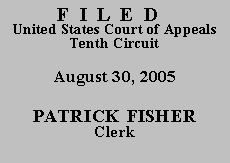 UNITED STATES COURT OF APPEALS
UNITED STATES COURT OF APPEALS
 UNITED STATES COURT OF APPEALS
UNITED STATES COURT OF APPEALS
TENTH CIRCUIT
WILLIAM A. ERICKSON,
Petitioner-Appellant.
v.
GARY WATKINS, Warden, Limon
Correctional Facility; ATTORNEY
GENERAL OF THE STATE OF
COLORADO,
Respondents-Appellees.
Before EBEL, McKAY, and HENRY, Circuit Judges.
This is a pro se prisoner appeal pursuant to 28 U.S.C. §§ 2254 and 2241. Petitioner was convicted of second-degree assault in Colorado state court. More than seven years after his conviction, Petitioner filed a § 2254 petition for habeas corpus relief with the United States District Court for the District of Colorado. In that petition, Petitioner alleged constitutional error in his state court conviction and challenged the execution of his sentence. The district court dismissed the habeas corpus petition as time barred pursuant to the one-year limitation period articulated in § 2244(d) and dismissed the § 2241 claim on the merits.
Thereafter, Petitioner moved the district court for a certificate of appealability, which the district court denied. Petitioner now requests a certificate of appealability from this court. The issues he raises on appeal are identical to those brought before the district court.
In order for this court to grant a certificate of appealability, Petitioner must make "a substantial showing of the denial of a constitutional right." 28 U.S.C. § 2253(c)(2). To do so, Petitioner must demonstrate "that reasonable jurists could debate whether (or, for that matter, agree that) the petition should have been resolved in a different manner or that the issues presented were 'adequate to deserve encouragement to proceed further.'" Slack v. McDaniel, 529 U.S. 473, 484 (2000) (internal citation and quotation omitted). When a habeas petition is denied by the district court for procedural reasons, as was the case here, Petitioner must clear the added hurdle of showing "that jurists of reason would find it debatable whether the district court was correct in its procedural ruling." Id.
We have carefully reviewed Petitioner's brief, the district court's disposition, and the record on appeal. Nothing in the facts, the record on appeal, or Petitioner's filing raises an issue which meets our standards for the grant of a
certificate of appealability. For substantially the same reasons as set forth by the district court in its September 30, 2004 Order, we cannot say that it is "debatable whether the district court was correct in its procedural ruling." Id. Nor can we say "that reasonable jurists could debate whether the petition should have been resolved in a different manner." Id.
Accordingly, we DENY Petitioner's request for a certificate of appealability and DISMISS the appeal. We also GRANT Petitioner's motion to proceed in forma pauperis on appeal.
Entered for the Court
Monroe G. McKay
Circuit Judge